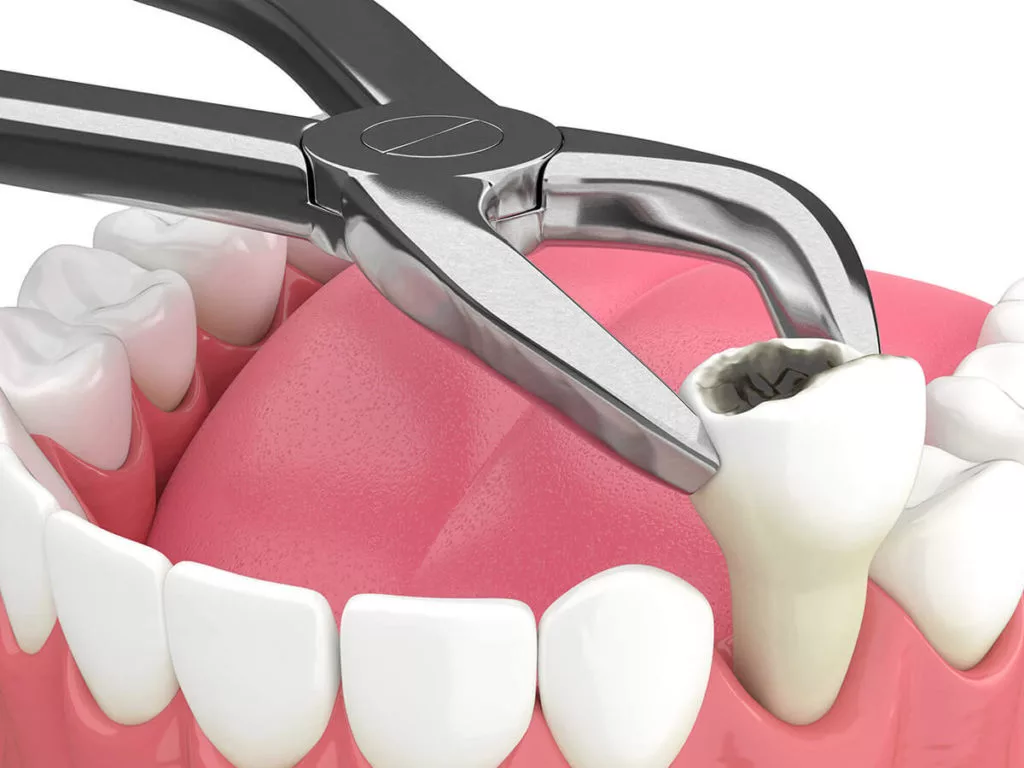
Tooth extraction is needed for several reasons, including severe injury or decay. Tooth extraction is one of the most common dental procedures that may help you keep microorganisms at bay and enhance your overall oral health. The extraction of a tooth from its socket in the bone is known as tooth extraction. It can be frightening and nerve-wracking to be faced with having a tooth extracted. Tooth extraction is a dental treatment that involves removing your tooth from its socket. We refer to it as “pulling” a tooth. If your tooth is beyond repair, it may need removal.
These are the types:
- Simple extraction or easy extraction
An extraction refers to the removal of a visible tooth from the mouth. Dentists use an elevator to help release the tooth. The dentist next removes the tooth with forceps.
- Surgical extraction
Surgery is necessary if the tooth has not yet erupted or has broken at the gum line. The dental surgeon makes a tiny incision in the gum to extract the impacted wisdom tooth or damaged tooth.
Who removes teeth?
Dentists and dental specialists such as oral surgeons and periodontists carry out tooth extractions. Regular dentists undertake countless extractions and send complex cases to oral surgeons and periodontists.
You should look for the top dental clinic in Bengaluru, if you require a tooth extraction. Alternatively, speak to your dentist. Or visit a dental hospital in Bengaluru.
Why is it required to pull a tooth?
Here is a list of some reasons for tooth extractions:
- Irreversible tooth decay
- A feasible periodontal disease treatment
- An impacted tooth can benefit from extraction.
- To minimise tooth crowding
- Following an accident, it is necessary.
- A filling or crown will not be able to repair the tooth because of its severe damage.
- If you have severe pain even after getting a filling, crown or root canal
What is the procedure for tooth extraction?
Your dentist can take your medical history and dental treatment history along with a list of drugs you are taking before tooth extraction.
- It’s vital to indicate whether you’re on any blood thinners or allergic to any medication.
- The doctor may prescribe antibiotics that you must take before the extraction.
- Your dentist can take your dental X-ray to understand the various causes.
- The doctor will advise you to stop smoking at least a day before the extraction since smoking might cause a dry socket and alveolar bone exposure.
- Your dentist will provide a local anaesthetic to numb the afflicted tooth and its surrounding region.
- If your tooth is severely decaying or has broken off at the gum line, your dentist may need to make incisions in your gums to have access to it.
- Your dentist may use general anaesthesia in some instances. Tooth extraction is a surgical operation that requires 2 to 3 hours, but you may return home the same day.
What are the health risks associated with tooth extraction?
- Dry tooth socket
- Adjacent teeth may get harmed.
- The injections have caused stiffness and discomfort in the jaw.
- Bleeding that lasts for more than 12 hours, along with a high fever and chills, indicates an infection.
- Vomiting or nausea
- Shortness of breath, cough, chest discomfort, and edema and redness at the surgery site
Conclusion
Dentists are skilled in removing teeth in the least invasive way possible. You can avoid tooth extraction if you practise proper dental hygiene and see a dentist regularly.
You can book an appointment at Apollo Dental in Bangalore. To schedule a consultation, call 18001020288.
You will need to rest for 48 to 72 hours after the tooth extraction.
You should avoid eating anything for 12 hours before the surgery. Eating will prevent nausea during and after the procedure.
Restrain yourself from excessive talking. Avoid talking after having a tooth extracted. Your tongue and related muscles move more when you talk, disrupting the clots. Following surgery, avoid vigorous mouth-rinsing or touching the wound region.


















































